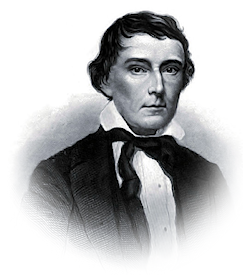Alexander H. Stephens to J. Henly Smith.
Crawfordville [Ga.], Oct. 13th, 1860.
Dear Smith, I got back from Hancock court this evening and found your letter of the 8th Inst. The news of the elections in Pa., Ohio and Indiana reached me at Sparta. I was not much disappointed though greatly saddened by the result. I have as you know ever since the final rupture at Baltimore been prepared for a general rout of the Democracy everywhere and the triumph of the Republicans in November. This conviction of the mind I have not been able to get rid of all the time. It is true I still hope for New York to prevent the catastrophe, but I see but little grounds upon which to rest a hope. We shall I fear very soon see the “beginning of the end” we have often heard so much of. I foresaw or thought I foresaw these coming events when the Administration began their war on Douglas on the grounds of his Freeport speech. That wickedly foolish policy has brought upon us all these troubles and those far greater troubles just ahead of us. Present appearances however will not cause me to relax in the least my endeavours to arrest the evils if possible. Should Mr. Breckinridge get the entire South and Lincoln the entire North no earthly power could prevent civil war. I do not know that it can be anyhow should Lincoln be elected. Still if those whose folly and wickedness brought it about should not be sustained at the South by public sentiment in their secession movement they may pause before pushing their projects to extremes. I do trust the popular vote of this State at least will not sustain them. How it will be I cannot venture a conjecture at this time. Had Indiana, Ohio or Pa. gone Democratic it would have aided us greatly. As it is I fear the sectional tendency in the popular mind will be increased by the result in all those States. I have not yet seen or witnessed the effect of these elections upon our people. The time has been too short. I shall fight on to the end. I made a speech on Wednesday in Sparta. It produced I was told a powerful effect. Many said it was the greatest speech I ever made. This I say to you though but to few would I so express myself. My health has greatly improved. I spoke two hours and a half. Next Wednesday I am to speak at Lexington—Saturday at Elberton, then at Savannah, and other places. Douglas is to be in Georgia on the 29th. We will keep the flag afloat even though he does not get a single electoral vote. Should the Government survive, the principles will live, they will form the basis for future action and organization. These are my views. I see the States and Union published the Confederacy’s report of my Atlanta speech. I was sorry for that. The report was a miserable one. The speech was one hour and a half long and the best parts were not alluded to, and in some instances I was very inaccurately reported. Indeed it was no report at all, it was simply an account of the speech put in the form of a verbatim report. I send you an account of our Dalton meeting, cut from the Rome Southerner. Judge Wright is the author of this. He was wonderfuly pleased with that demonstration. Mr. Cobb I see has come home and gone to stumping. Mr. Toombs is active. He spoke at Warrenton and Sparta during court. His speeches had no effect at either place. Linton is going up to a mass meeting at Turnpike Gate near Cuhutta Mountain in Murray County next Saturday. It is on the line of Gilmer and Murray counties. The popular mind is fast beginning to be awakened to the importance of the issues. If we had but six months to go upon I do verily believe the state could be carried for Douglas. All I now hope for is to defeat the seceders before the people. Continue to write to me. The letter of the 8th is the only one I have got from you since the one at Kingston. I fancy that I see a letter from you occasionally over the signature of Cleaveland in the Cincinnati Enquirer. Am I right or not? And if so, am I not good at guessing? I shall go to Oglethorpe Court Monday, and I shall not be home until Monday week. Then I wish to get a letter from you. Jones, our member of Congress, is out canvassing the district for the seceders’ ticket. I understand he spoke in this place Thursday of this week. He had a small crowd. Breckinridge will not get exceeding fifty votes in this county I think. Bell will probably get a plurality. Douglas and Bell together will get a large majority in the district. If Bell could sustain Akin’s vote in the State, there would be no difficulty in defeating Breckinridge before the people. But I fear he will not. He will I think lose several thousand of Akin’s vote. Some will vote for Douglas but most of them who fall off will [illegible] vote for Douglas. I have not time to say more—so good night.
From Annual Report of the American Historical Association for the Year 1911.
Alexander Hamilton Stephens was an American politician who served as the vice president of the Confederate States from 1861 to 1865. After serving in both houses of the Georgia General Assembly, he won election to Congress, taking his seat in 1843. After the Civil War, he returned to Congress in 1873, serving to 1882 when he was elected as the 50th Governor of Georgia, serving there from late 1882 until his death in 1883.
J. Henley Smith was a Georgia journalist.
